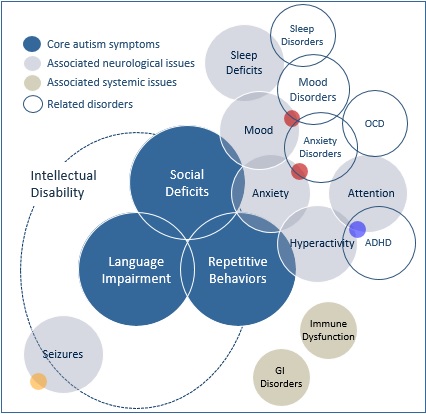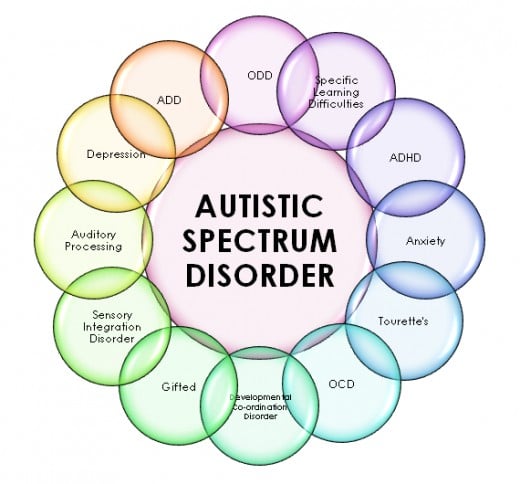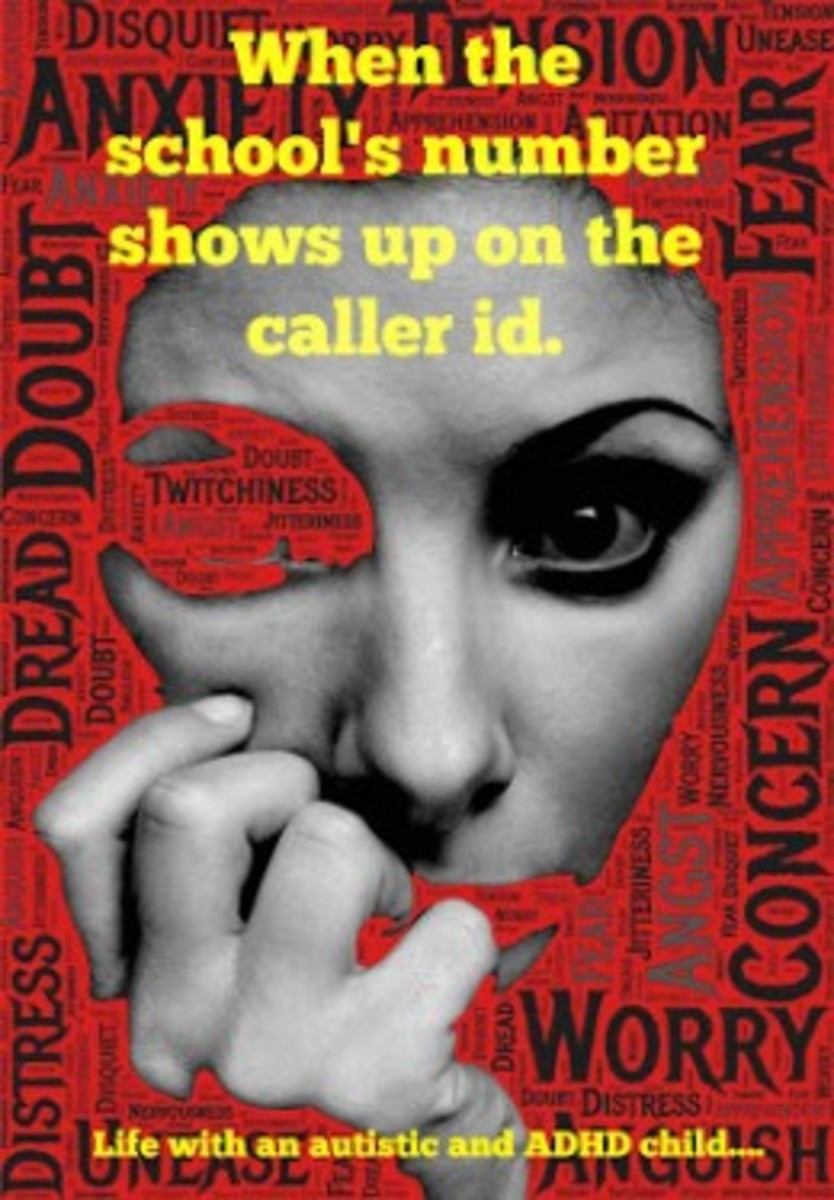- HubPages»
- Health»
- Diseases, Disorders & Conditions»
- Autism & Asperger's Syndrome
Designing a survey on Autism
Information Collection
This survey questionnaire is designed to collect information for my college psychology project research study. My research study is on the topic of developmental psychology with a focus on the effect that occupational therapy has on allowing a person with autism to become a functional part of society. My study will explore the ways in which providing occupational therapy to a child with autism helps him or her to develop into an adult who is able to be an active member of society. The information collected from this survey questionnaire will be kept anonymous and no identifying information about the respondents will used in my research study. Participants will only be referred to as subject1, subject2, and so on in the research study.
Instructions
Please keep in mind that while these questions will be used in a research study which involves autism; unless the questions specifically mention autism, then the question does not involve a person with autism.
This survey questionnaire will include multiple-choice questions, text entry questions, and rank order questions. For all of the survey questions, please read the questions carefully then consider your answer before selecting or writing it. For multiple-choice questions, you will need to select the answer to the survey question from multiple options. For text entry questions, you will be able to type your own answer to the questions in the space provided; please use complete sentences and avoid one-word answers. For the rank order questions, you will be asked to put a list of terms in order of importance for you.
Please attempt to answer all questions to the best of your ability, however, if you are uncomfortable answering a question, please skip it; do not select an answer at random. For text entry questions, simply do your best if you are unsure of what to write.
Autism Survey
Survey Questionnaire
1) How old are you?
a) 18-25
b) 26-36
c) 37-49
d) 50 or older
2) Are you:
a) Male
b) Female
3) What ethnicity do you identify yourself as?
a) Caucasian
b) African American
c) Asian
d) Hispanic/Latino
e) Other
4) What is the highest level of education that you have completed?
a) Less than high school
b) High school
c) Vocational
d) Undergraduate
e) Graduate
5) Do you have experience with a person with autism? If yes, please explain.
6) Does an active member of society require a job?
a) Yes
b) No
c) It depends on the individual
7) Rank these skills in order of importance for day-to-day living:
a) Communication
b) Problem Solving
c) Personal Hygiene
d) Ability to Process Instructions
e) Coping Skills
f) Money Management
g) Domestic skills
h) Learning and Retention
i) Social Skills
8) Rank these skills in order of importance for independent living:
a) Ability to Maintain Eye Contact
b) Communication Skills
c) Money Management
d) Personal Hygiene
e) Social Skills
9) Do you believe people with autism can learn to be an active member of society?
a) Yes
b) No
10) Rank the following skills in order of importance for an autistic individual to be an active member of society:
a) Communication
b) Problem Solving
c) Personal Hygiene
d) Ability to Process Instructions
e) Coping Skills
f) Money Management
g) Domestic skills
h) Learning and Retention
i) Social Skills


Throughout the course, you learned about many different types of research and when and where it would be conducted. Despite all the different methods that psychologists use to gather data and report results, many still consider the field a soft science. Read the article Public Skepticism of Psychology for a description of why psychology might be viewed as a soft science. After reading the article, use information that you have learned in the course to dispute this view. Discuss specific ideas you have learned in the course that illustrate the soundness of psychological research. Next, discuss how you might apply the skills you have learned throughout the course to your career and personal life. Discuss how understanding the course material will help you in your professional and personal life.
Psychology has often been viewed as a soft science for six main reasons according to Lilienfeld (2011) these six reasons are: “psychology is merely common sense, psychology does not use scientific methods, and psychology cannot yield meaningful generalizations because everyone is unique, psychology does not yield repeatable results, psychology cannot make precise predictions, and psychology is not useful to society.” My personal experience as a psychology student at Southern New Hampshire University and from my Research Methods II class has taught me that these beliefs are all false.
The first reason which states that psychology is merely common sense is incorrect as every person’s common sense is different because common sense is based on a person’s knowledge and experience; for example, a psychology professional might see one thing as common sense while a student might not view it as common sense. The second reason of psychology not using scientific methods is also false as psychological research generally utilizes experimental research methods; it is believed that they provide the best tool for conducting research as they make use of scientific research methods. The third reason of psychology being unable to provide meaningful generalizations because every person is unique is also false as the psychological research studies focus on one aspect of the research participants and not on their individuality. For example, a research study conducted on using time aids to help improve the time management ability of autistic children would not be on the children’s personalities, but rather the effect of the time aids on improving their ability to manage their time.
The fourth reason that psychology does not yield repeatable results is untrue because every published research study includes a detailed methods section so that the study could be repeated; the results could vary slightly due to the research participants selected, but the overall results would still show the same results. The fifth reason of psychology being unable to make precise predictions depends on the type of research being conducted. An experimental research study should be able to make precise predictions, but an observational study would be more likely to make general predictions.
The final reason psychology is not being useful to society has been proven untrue numerous time, since psychology has been created. Every time a research study finds a new or more effective way to treat a condition it proves its’ usefulness to society. Schaaf’s et al., (2013) research study evaluated whether the intervention of occupational therapy was effective in lessening sensory dysfunction in children with autism; the results indicated that the participants who received an extra three hours of sensory integration therapy per week scored higher when attaining their goals. In this case, the research study found a way to help children with autism improve their quality of life and their ability to function. The results will help autistic individuals to improve their ability to function in society.
I have learned new skills in the Research Methods II class that will prove useful throughout the course of my career and personal life. I plan to have a career which allows me to work with special needs children and the research that I completed for my final paper will prove beneficial in to that end. The fact that I have learned how to critique and analyze research studies and articles will prove useful for the rest of my college courses as it will allow me to find and utilize a higher quality of sources in my writing. In my personal life, I feel like I have gained a better understanding of why people make the decisions that they do.
References
Lilienfeld, S. O. (2011, June 13). Public Skepticism of Psychology: Why Many People Perceive
the Study of Human Behavior as Unscientific. American Psychologist. Advance online
publication. doi: 10.1037/a0023963
Schaaf, R. C., Benevides, T., Mailloux, Z., Faller, P., Hunt, J., Hooydonk, E. V., . . . Kelly, D.
(2013). An Intervention for Sensory Difficulties in Children with Autism: A Randomized Trial. Journal of Autism and Developmental Disorders, 44(7), 1493-1506. doi:10.1007/s10803-013-1983-8








